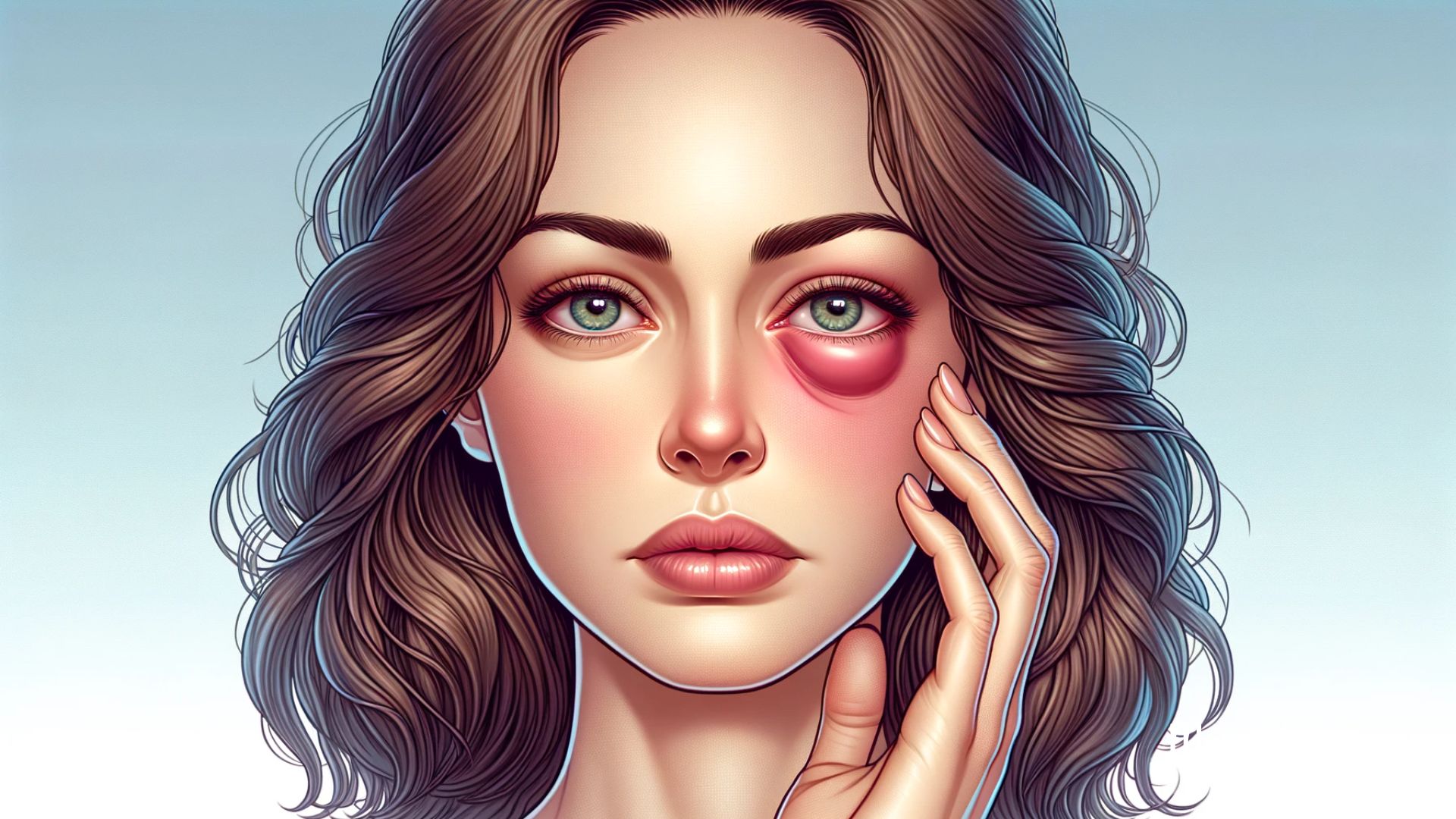Why Is My Eyelid Swollen?
When you wake up to find your eyelid swollen, it can be alarming. Swelling of the eyelid can be due to a variety of reasons. Often, it’s something as simple as fluid retention from sleeping, or it might be an allergic reaction. However, sometimes, it can be a sign of an infection or a more serious condition.

Common Causes of Eyelid Swelling
Allergies
Allergies are a common reason why your eyelid might be swollen. For example, you might have come into contact with something that irritates your eye, like pollen or pet dander. In response, your body releases histamines, which can cause swelling.
Infections
Infections are another common cause. If you have an infection like conjunctivitis, also known as pink eye, or a stye, which is an infection of the glands in the eyelid, you’ll often see swelling.
Blocked Glands
Sometimes, the tiny oil glands in your eyelids can get blocked. This can lead to a condition called blepharitis, which causes swollen and red eyelids.
Injuries
An injury to the eye or eyelid, such as a scratch or trauma, can cause swelling as your body rushes to heal the injured area.
Chalazion
A chalazion occurs when a blockage in one of the small oil glands at the margin of the eyelid leads to a swollen, firm lump. Although similar to a stye, a chalazion is generally less painful and tends to be chronic.
Cysts
Cysts, such as an eyelid cyst, can also cause swelling. These are typically harmless and may clear up on their own, but if they’re bothersome or persistent, a doctor can offer treatments like drainage or corticosteroid injections.
Herpes Simplex Virus
The herpes simplex virus can cause a condition called herpes keratitis, which affects the eye and can lead to eyelid swelling, among other symptoms.
Fluid Retention
Sometimes, your body retains fluid under the eyes, especially after a salty meal or a night with little sleep. This can cause your eyelids to appear puffy or swollen.
Contact Lenses and Eye Makeup
For those who wear contact lenses or eye makeup, improper use or allergic reactions to these products can contribute to swollen eyelids. It’s essential to maintain good hygiene with contact lenses and to remove eye makeup thoroughly each night.
Orbital Cellulitis
This is a rare but severe condition involving an infection that spreads to your eye socket. If you have orbital cellulitis, you must see a doctor immediately, as it can be vision-threatening.
Medical Conditions
There are also medical conditions that can lead to eyelid swelling, such as thyroid issues like Graves’ disease. This is less common but still a possible cause.
When to See a Doctor
You should consider seeing a doctor if the swelling:
- Persists for more than a couple of days without improvement
- Is accompanied by severe pain or visual impairment
- Comes on very suddenly and severely
- Is associated with redness, tenderness, and warmth, which could indicate an infection
In addition, if you have other symptoms like fever, difficulty breathing, or face swelling, seek medical attention immediately, as these could be signs of a more severe allergic reaction or infection.
How to Reduce Swelling at Home
Cold Compress
A cold compress can often provide relief. You can use a clean cloth dipped in cold water or a bag of frozen vegetables wrapped in a cloth. Apply it to your eye for a few minutes at a time.
Clean Your Eyelids
Keeping your eyelids clean is also important. You can use a gentle cleanser or baby shampoo diluted with water to lightly scrub your eyelids.
Over-the-Counter Remedies
For allergies, over-the-counter antihistamines might help reduce swelling. If you know what you’re allergic to, try to avoid those allergens.
Elevate Your Head
When sleeping, try to keep your head a bit elevated to prevent fluid from pooling around your eyes.
Professional Treatment
If home remedies don’t help, medical treatment may be necessary. Depending on the cause, a doctor might prescribe:
- Antibiotic or antiviral eye drops for an infection
- Steroid creams for severe inflammation
- Specialized cleansers or medications for conditions like blepharitis
Always follow your doctor’s instructions on medication use to ensure the best recovery.
Prevention
Good Hygiene
Maintaining good eye hygiene is crucial. Regularly wash your hands, avoid rubbing your eyes, and keep your eye area clean to prevent irritation and infection.
Diet and Lifestyle
A balanced diet and adequate hydration can also help prevent swelling. Reducing salt intake can decrease fluid retention, and staying hydrated helps maintain overall health.
Proper Sleep
Ensure you’re getting enough sleep. Sleep deprivation can lead to swollen eyelids as well as other health issues.
Allergen Control
If you have allergies, controlling your environment by using air purifiers, keeping windows closed during high pollen days, and washing bedding frequently can help reduce exposure to allergens.
Monitoring and Managing Ongoing Conditions
For chronic conditions that cause eyelid swelling, such as blepharitis or thyroid eye disease, ongoing management with a specialist is important. They can provide you with a long-term treatment plan and monitor your condition to prevent complications.
The Role of Health Professionals
Optometrists, ophthalmologists, and sometimes dermatologists are vital in diagnosing and treating eyelid swelling. They can run tests, such as swabs or imaging, to determine the underlying cause and recommend appropriate treatments.
In the end, while eyelid swelling can often be managed at home, you should never hesitate to reach out to a healthcare professional for advice. They can help you understand the cause of your symptoms and give you the proper treatment, ensuring that your eyes stay healthy and comfortable.
